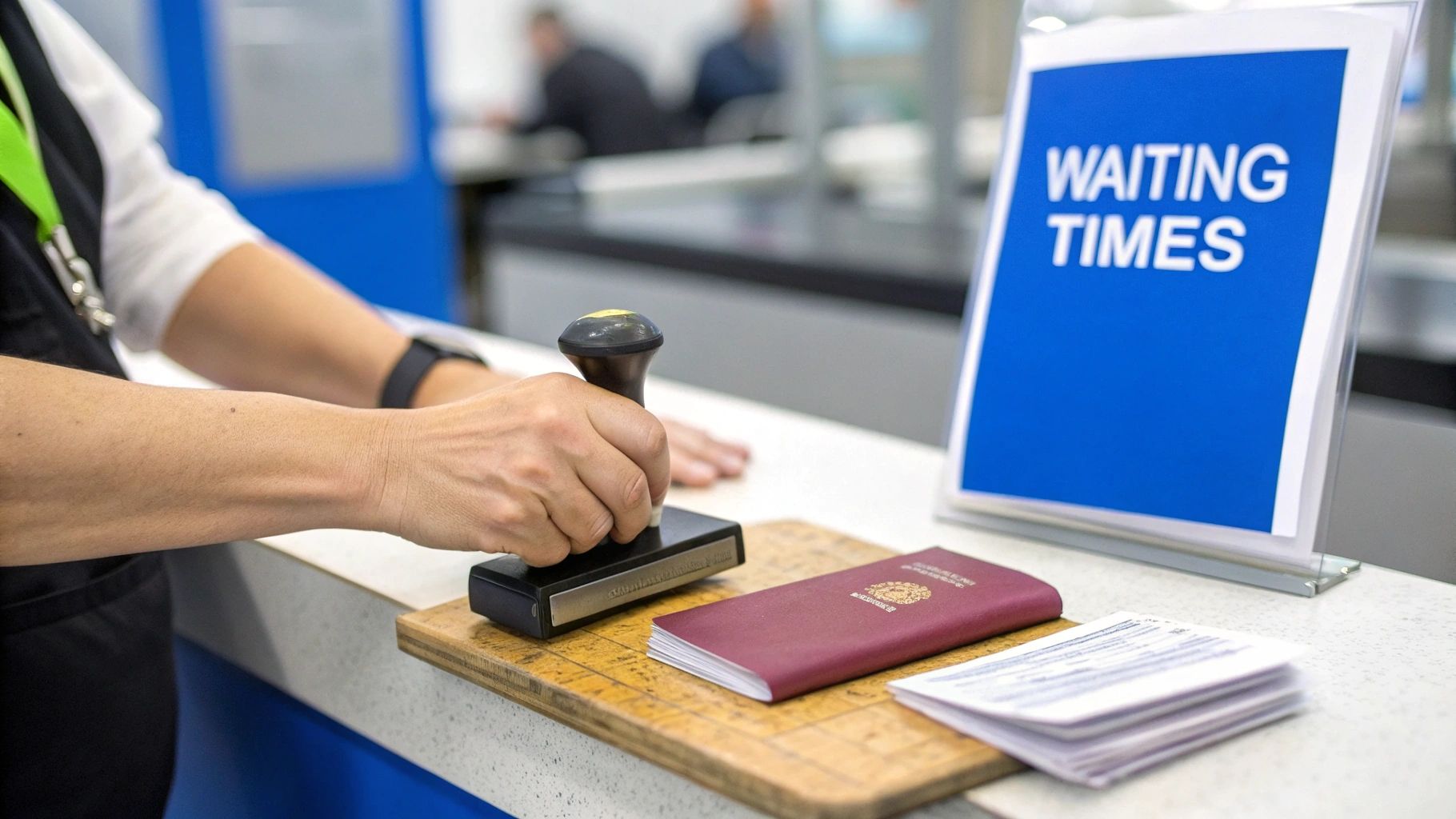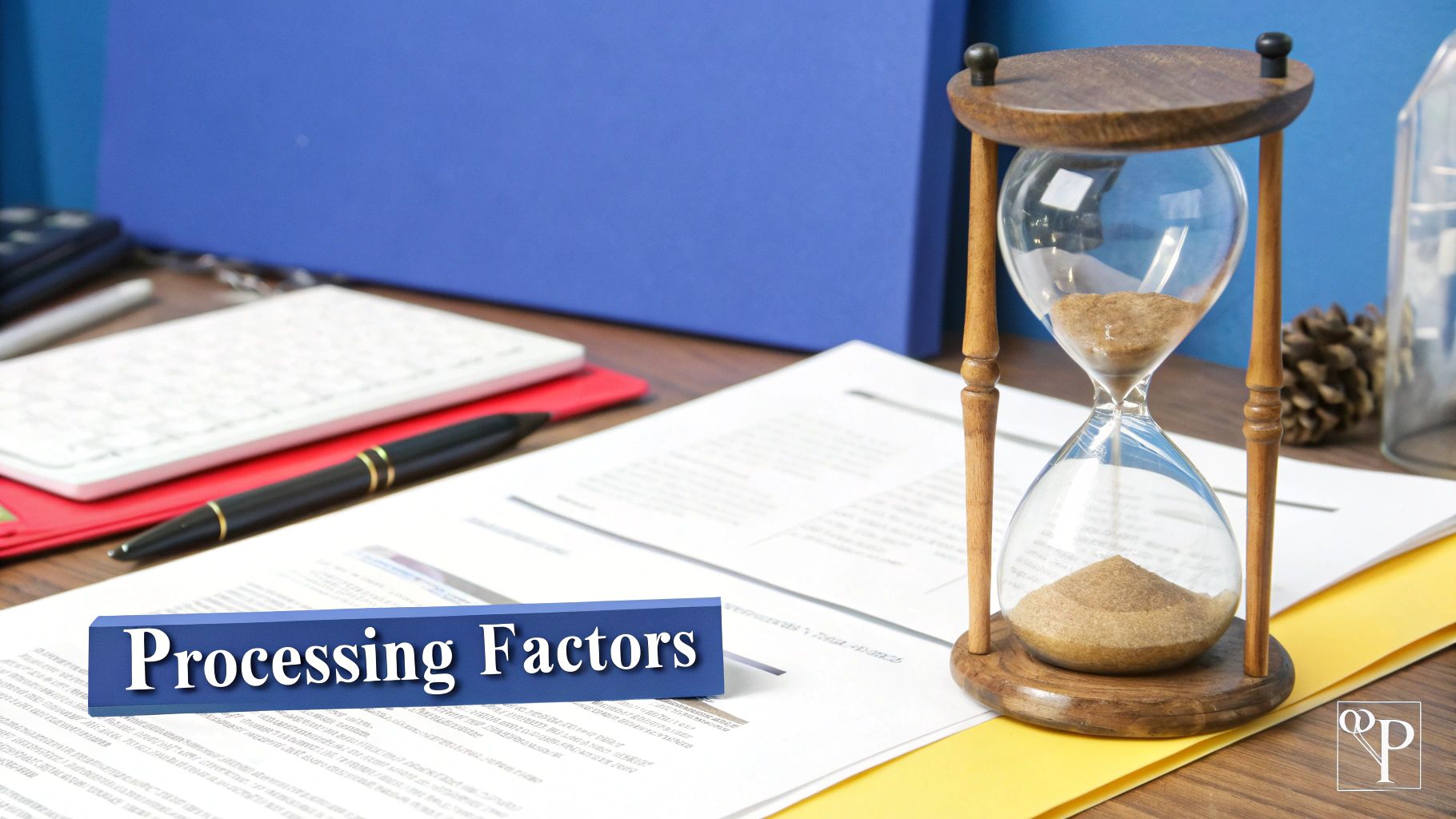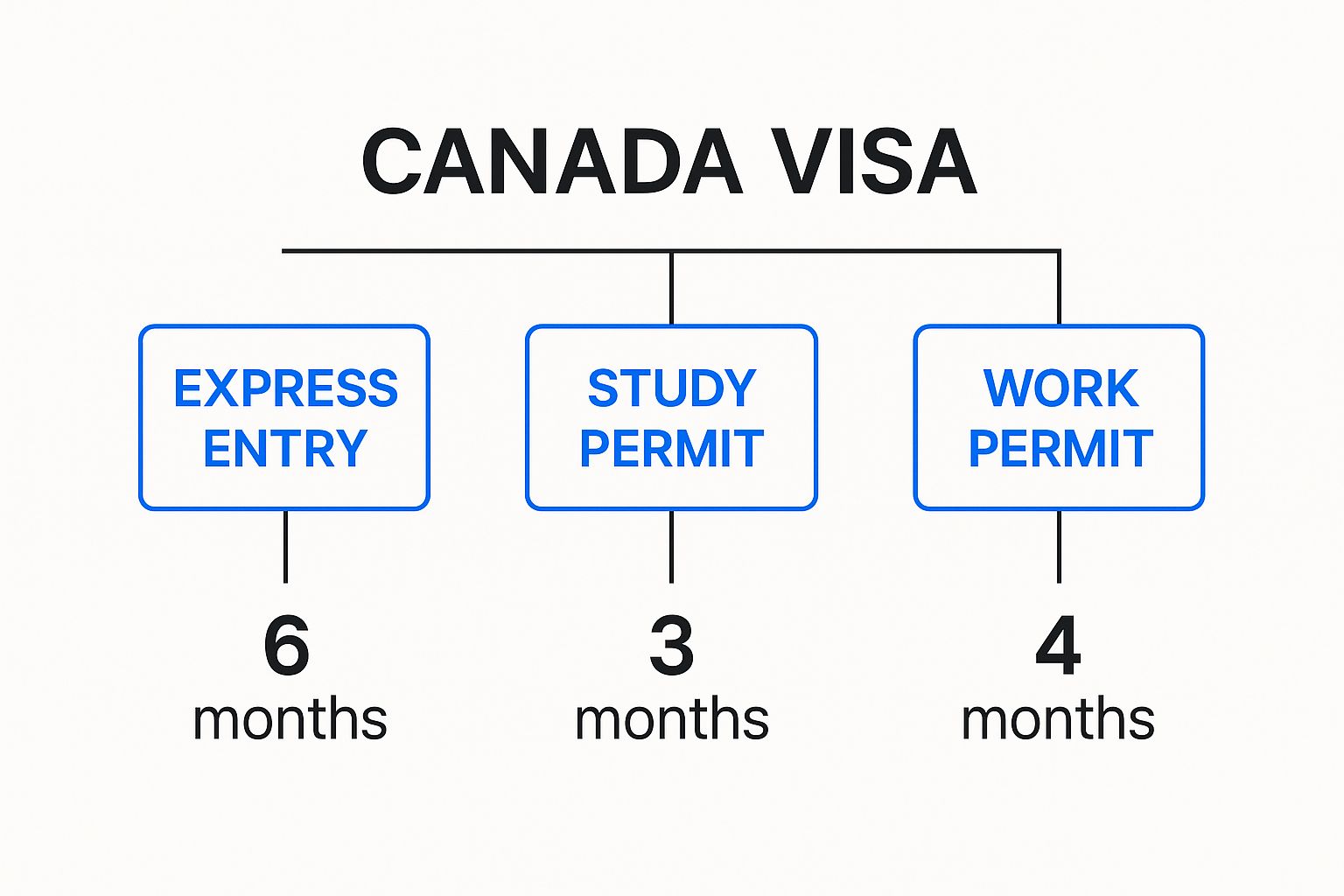Canada Visa Waiting Time Explained for Nigerians

Waiting for a decision on your Canadian visa application can feel like it's taking forever, but getting a handle on the current timelines is the first step to managing the anxiety.
For Nigerians, the wait time for popular visas like visitor or study permits can be anything from a few weeks to several months. A lot of it comes down to how well-prepared your application is and just how many other people are applying at the same time.
A Realistic Look at Canada Visa Waiting Times
The path to Canada is an exciting one, but let's be honest—the visa waiting game can be incredibly stressful for Nigerians. It’s a period filled with compulsively checking your email and refreshing the IRCC portal, just hoping for some good news.
This feeling of uncertainty is something most Nigerian applicants share, whether you're a student trying to get to Toronto for your first semester, a professional with a job offer in Calgary, or just hoping to visit family.
Understanding why it takes this long really helps. Picture it like the queue at a popular embassy in Lagos or Abuja on a Monday morning. The sheer volume of applications means the processing centre has to meticulously check every single one. This guide is designed to cut through that anxiety and give you a clear, realistic picture of what to expect.

Key Timelines for Nigerians
To give you a better idea, here’s a quick breakdown of what you can generally expect for the most common visa types:
- Visitor Visas: These timelines can swing wildly, often depending on peak travel seasons like summer or Christmas.
- Study Permits: Timing is often tied to the school calendar, so applying well ahead of the September or January intake is crucial.
- Work Permits: The wait here depends heavily on your job type and whether your employer needs a Labour Market Impact Assessment (LMIA).
The good news is that we've seen some real improvements in processing times for Nigerian applicants lately. For example, as of late 2023, the average processing time for a Canada visitor visa from Nigeria is hovering around 28 to 31 days. That’s a huge improvement from previous years when it wasn't uncommon to wait over 80 days. You can always check the latest updates on platforms like CIC News.
The most powerful tool you have to manage the waiting period is a perfectly prepared application. A file that is clear, complete, and easy for a visa officer to understand is a file that gets processed faster. No long story.
For a comprehensive walkthrough of the entire journey, our guide on how to relocate to Canada from Nigeria is a fantastic resource.
Canada Visa Processing Time Snapshot for Nigerians
Here's a quick summary table to give you an at-a-glance view of what to expect for some of the most sought-after visa categories.
| Visa Category | Estimated Average Waiting Time | Key Consideration |
|---|---|---|
| Visitor Visa | 28 – 31 days | Highly variable; depends on application volume and season. |
| Study Permit | ~8 weeks | Apply months before your school's start date to avoid issues. |
| Work Permit | ~10 weeks | Can be longer if a Labour Market Impact Assessment (LMIA) is required. |
| Express Entry | ~6 months | This is post-ITA (Invitation to Apply); the initial profile stage varies. |
These figures are just averages, of course. Your individual experience could be shorter or longer depending on the specifics of your case and how busy the visa office is.
Why Do Canadian Visas Take Longer to Process from Nigeria?
Ever submitted your application and then watched a friend from another country get their decision weeks, or even months, before you? It's a common and frankly, frustrating experience for many Nigerian applicants. But the reasons behind the longer Canada visa waiting time aren't personal; they're based on some very practical, on-the-ground realities. Getting a handle on these factors can help set your expectations for the long wait ahead.

A few key operational factors come into play, and they all add up. The simple truth is that the Canadian visa offices that handle applications from Nigeria are some of the busiest on the planet.
The Sheer Volume of Applications
Picture the visa office in Lagos like the most popular branch of GTBank on the last banking day of the month. The queue snakes out the door, and every single person's transaction has to be handled with care. That's a pretty good picture of what's happening with visa applications.
Nigeria consistently ranks among the top countries for the number of applications submitted to Canada each year for tourism, study, and work. This massive volume creates a natural backlog, meaning visa officers have a literal mountain of files to work through before they even get to yours. And each one requires careful, individual attention.
A high volume of applications doesn't just mean a longer queue; it means every single application in that queue is subject to the same high level of scrutiny, which simply cannot be rushed.
This is exactly why you see such a noticeable difference in the official processing time data. For example, at certain times, the average visa processing for Nigerian applicants hovers around 85 calendar days. Compare that to applicants from India (around 24 days) or the United States (about 20 days), and the difference is stark. You can explore more insights about these global processing time comparisons to see the bigger picture.
Meticulous Document Verification
Another huge piece of the puzzle is the intense verification process for every document submitted. Visa officers have to be absolutely certain that every piece of paper you provide is legitimate. This isn’t just a quick look-over; it's a deep dive.
They need to be confident that:
- Your bank statements are genuine and show a consistent financial history, not just a sudden, large deposit made last week to "package" your account.
- The employment letter you submitted is from a real, verifiable company and that you are an actual employee.
- Your proof of ties to Nigeria, like property deeds or family records, are authentic and compelling.
This verification often involves cross-checking information with various Nigerian institutions, which can add days or even weeks to your timeline. It’s a crucial step for maintaining the integrity of Canada's immigration system, but it’s also a direct cause of the extended Canada visa waiting time for applicants from Nigeria.
Understanding Processing Times for Each Visa Type
Not all visa applications move at the same speed. Just like sending a letter versus a large parcel, the canada visa waiting time changes a lot depending on whether you're applying for a quick visit, to study, or to work long-term. Getting a handle on these differences is the first step to setting realistic expectations for your journey.
Each visa category comes with its own specific set of checks and balances, and this directly affects how long you'll be waiting for a decision. A straightforward visitor visa, for example, might be processed relatively quickly. A study permit, on the other hand, requires the visa officer to verify your admission letter and carefully scrutinise your proof of funds, adding extra steps to the process.
This visual breakdown gives you a snapshot of the average processing times for three of the most popular visa routes for Nigerians.

As you can see, Express Entry applications tend to have the longest timeline. This makes sense when you consider the detailed checks involved in granting someone permanent residency. Study permits, while still thorough, are often processed more quickly.
Let's dive deeper into the specifics for each category to give you a clearer picture of what to expect.
Detailed Processing Timelines by Visa Category
The table below offers a comprehensive look at the various stages and total estimated wait times for different Canadian visa applications from Nigeria. It highlights not just the average duration but also some of the unique hurdles that can influence how long each one takes.
| Visa Type | Average Processing Time | Factors Unique to this Visa |
|---|---|---|
| Visitor Visa | 4-6 weeks | High volume of applications, especially during peak travel seasons, can cause delays. |
| Study Permit | 8-12 weeks | Requires verification of Letter of Acceptance (LOA) and detailed financial review. |
| Work Permit (with LMIA) | 4-6 months | The Labour Market Impact Assessment (LMIA) process itself adds significant time before the visa application is even submitted. |
| Express Entry (CEC/FSWP) | 5-6 months (post-ITA) | Dependent on the complexity of your work history and document verification. |
| Express Entry (PNP) | 7-8 months (post-ITA) | The provincial nomination stage adds an extra layer of processing before the federal stage. |
| Non-Express Entry PNP | Up to 19 months | This is a much longer, paper-based process that involves both provincial and federal government reviews separately. |
These numbers are a good starting point, but remember they're just averages. Your personal situation will always play a huge role in the final timeline.
Timelines for Study and Work Permits
For the many Nigerians heading to Canada for school, the study permit application is a massive milestone. The process isn't just about filling out a form; Immigration, Refugees and Citizenship Canada (IRCC) needs to be absolutely sure your Letter of Acceptance from a Designated Learning Institution (DLI) is legit. They also need to be convinced you have the financial muscle to support yourself without issues. These layers of verification are what contribute to a typical wait time of several weeks.
Work permits are another popular pathway. The timeline here often hinges on whether your employer needs a Labour Market Impact Assessment (LMIA). An LMIA is a document that proves they tried, and failed, to find a Canadian citizen or permanent resident to fill the job. If your job offer requires an LMIA, that step alone can add months to your overall wait before you even get to submit your own application. For a complete walkthrough, it’s worth exploring the specifics of the Canada work visa permit process.
Key Takeaway: The more complex the verifications needed for your visa—like confirming a school admission or an employer's legitimacy—the longer you should expect your application to take. Simple as that.
A Closer Look at Express Entry Streams
If your goal is permanent residence in Canada, the Express Entry system is almost certainly your main route. But even within this system, the canada visa waiting time can be drastically different from one stream to another. Think of it like different toll lanes on a highway; some are automated and fast, while others require manual checks and move much slower.
As of early 2024, data shows that streams like the Canadian Experience Class (CEC) and the Federal Skilled Worker Program (FSWP) both have an average processing time of about 5 to 6 months after you receive an Invitation to Apply (ITA).
Provincial Nominee Programs (PNPs), however, are a different story. An Express Entry-linked PNP application might take 7 to 8 months, but a non-Express Entry PNP application could stretch out as long as 19 months to process. The difference is huge, so it pays to know which lane you're in.
How to Check Your Visa Application Status Online
Once you've hit 'submit' on your application, the waiting game begins. It’s easy to feel like your file has disappeared into a black hole, but thankfully, you don't have to stay completely in the dark. Immigration, Refugees and Citizenship Canada (IRCC) gives you a direct line of sight into your file's progress, which can help you make sense of the Canada visa waiting time for your specific situation.
Keeping tabs on your status is the best way to manage the stress of waiting. The process is pretty straightforward and gives you a clear picture of where things are at. It helps you know if your application is moving along as it should or if there might be a hiccup.

A Step-by-Step Guide to the IRCC Portal
To get started, you'll need the same login details you used when you first submitted your application online. It’s a simple process.
- Head to the Official IRCC Website: Go directly to the secure portal where you originally applied.
- Log In to Your Account: Enter your GCKey or Sign-In Partner credentials to get to your dashboard.
- Find Your Application: After logging in, you'll see a list of applications you've submitted. Just click on the specific one you want to check.
- View Your Status: The portal will show you the most current status of your application.
Doing this simple check can offer a lot of peace of mind. If you want to dive deeper into monitoring your file, you might find our guide on visa application tracking helpful, as it explores different tools and platforms.
What Do the Status Updates Really Mean?
Let's be honest, the terms IRCC uses can be a bit confusing. It's incredibly common for Nigerians to see their application marked "In Progress" for weeks, or even months. This doesn't automatically mean there's a problem.
"In Progress" is just a catch-all term. It covers everything from the initial eligibility check right through to the final background verifications. Think of it as a sign that your application is in the queue and being actively handled, not a red flag.
Here’s a quick breakdown of what you'll typically see:
- Submitted: This confirms IRCC has successfully received your application.
- In Progress: An officer is reviewing your file and the documents you provided.
- Final Decision: A decision has been reached. You will get a separate message or letter detailing the outcome, whether it's an approval or a refusal.
What if your application sails past the standard processing time for your visa category with no decision? In that case, and only after the official waiting period has passed, you can use the IRCC web form to send a formal enquiry for an update.
Practical Steps to Avoid Unnecessary Application Delays
While you can't control the massive volume of applications hitting an officer's desk, you absolutely can control the quality of your own. Your best strategy for cutting down the Canada visa waiting time is to submit a file so clean, logical, and complete that it’s easy for them to say yes.
Think of it this way: you want to hand them a decision-ready application. Many of the frustrating delays Nigerian applicants face boil down to common, and entirely avoidable, mistakes. By getting ahead of these potential problems, you make the visa officer's job easier, which can only help your case. Though it's from a different field, looking into strategies for reducing process duration can offer a fresh perspective on making any process more efficient.
Master Your Proof of Funds
One of the biggest red flags for a visa officer is a messy financial history. It’s not just about showing you have the money; it’s about proving that money is legitimately yours and didn't just appear overnight.
A classic mistake is a large, unexplained sum of money landing in your account right before you apply. Let's say your uncle transfers ₦5 million into your account a week before you print your bank statement. That's going to raise immediate questions and almost guarantee a delay while they investigate. It looks like you borrowed the money just to pass the review.
Here’s how to get it right:
- Build a History: Present a bank statement from an account that clearly shows you saving consistently over the last six months or more.
- Explain Large Deposits: If you did receive a large sum legitimately—maybe you sold a car or received a formal gift—provide the proof. Include the official deed of sale or a notarised gift deed to explain exactly where the money came from.
- Keep it Clean: Avoid shuffling large amounts of cash between different accounts right before you apply. Your financial story should be simple and easy to follow.
Secure Key Documents Well in Advance
Some documents just take a long time to obtain. Waiting until the last minute to request them is a recipe for derailing your entire application timeline. For Nigerian applicants, the Police Character Certificate (PCC) is a perfect example; the process can easily stretch over several weeks.
Don't wait until you get an Invitation to Apply (ITA) or a letter of admission to start gathering these crucial documents. Kick off the process for things like your police certificate and academic transcripts as early as you possibly can. That little bit of foresight can save you weeks of stress.
Write a Compelling Statement of Purpose
Your Statement of Purpose (SOP) or Letter of Explanation is your one chance to talk directly to the person deciding your fate. A vague letter full of clichés only creates questions, and questions cause delays. You need to be specific, clear, and persuasive.
Don’t just write, "I want to study in Canada for better opportunities." That tells them nothing. Instead, paint a clear picture. For example: "My goal is to complete the Master of Data Science programme at the University of British Columbia to gain expertise in machine learning. I plan to apply these skills to solve specific challenges within Nigeria's growing fintech sector upon my return."
This kind of statement shows you have a clear plan, strong intentions, and solid ties to your home country. It answers the officer’s questions before they even have to ask them, helping them make a faster, more confident decision.
What to Do When Your Application Is Taking Too Long
When your Canada visa waiting time drags on for months, blowing past the official average, it’s easy to feel helpless. The silence from IRCC can be incredibly frustrating, but now is the time for a calm, measured approach, not panic. You have concrete steps you can take to get some clarity.
Instead of just waiting and worrying, your first official move should be to use the IRCC web form. This isn't just a suggestion box; it’s a formal channel for requesting a status update on your file. A word of caution, though: only use this tool if your application is genuinely beyond the standard processing time. Contacting them too early will just get you a template response and won’t speed anything up.
Digging Deeper for Answers
If the web form doesn't yield a helpful answer, your next, more powerful move is to order your GCMS notes.
Think of GCMS (Global Case Management System) notes as the detailed logbook for your application. They contain everything—from the moment your file was opened to every single action taken and every comment an officer has jotted down. This is the most direct way to find out exactly what the hold-up is.
For a small fee, you can request these notes through an Access to Information request. It’s like getting a look behind the curtain, revealing whether there's a specific document they're struggling to verify or if your file is simply stuck in a long security check queue. This information is pure gold because it points you to the exact problem.
When to Bring in Extra Help
If the delay becomes extreme and you’ve exhausted the other options, there are two other avenues you can explore.
- Contacting a Member of Parliament (MP): Your local MP's office in Canada can make an enquiry to IRCC on your behalf. This works best when you have a pressing reason for the delay causing real hardship, like a firm job offer with a start date or an approaching school semester. An enquiry from an MP's office often gets a more detailed response from the visa office than you would get on your own.
- Legal Action: In rare and truly prolonged cases, some people consider a "writ of mandamus." This is a serious legal step to compel IRCC to make a final decision on an application that has been unreasonably delayed. It's an expensive and complex route, and it should only ever be considered a last resort after getting advice from an experienced immigration lawyer.
Your Top Questions Answered
When you're navigating the Canadian visa process, it's natural for questions to pop up, especially about how long you'll have to wait. We've compiled some of the most common questions we hear from Nigerian applicants to give you the clear, straightforward answers you need.
Can I Pay Extra to Speed Things Up?
This is probably one of the most frequent questions we get: can you pay a fee to fast-track your canada visa waiting time? The answer, in short, is no. Immigration, Refugees and Citizenship Canada (IRCC) simply doesn't offer a paid priority service for standard visa applications coming from Nigeria.
The best—and only—way to get a quicker decision is to give them an application that’s so complete and easy to understand that the visa officer can make a decision without any back-and-forth. Be very cautious of anyone claiming they can speed up your application for an extra fee. It’s not a legitimate service.
Will a Past Visa Refusal Slow Me Down?
It's a common worry for many Nigerians: if you've been refused a visa for another country like the US or UK, will it automatically delay your Canadian application? While it doesn't necessarily add to the waiting time, it definitely means your application will be looked at more closely.
You absolutely must declare any previous refusals. The visa officer will want to understand exactly why you were denied before to see if those same issues might still be a concern. Trying to hide a refusal is a huge red flag; it's considered misrepresentation and will almost certainly lead to another refusal and could even get you banned from applying to Canada for several years.
Transparency is key. It's always better to explain a past refusal honestly than to have it discovered later. A hidden refusal destroys your credibility and your chances of getting approved.
What Does "In Progress" Actually Mean?
It can be nerve-wracking to see your application status stuck on "in progress" for weeks, or even months, without an update. This is incredibly common and usually isn't a sign that something is wrong. That status is a catch-all term for everything happening behind the scenes, from initial eligibility checks to in-depth background verifications.
Considering the sheer volume of applications from Nigeria, these long stretches are pretty normal. The time to start getting concerned is when your application has gone well beyond the official average processing time for your specific visa category. If that happens, the first thing you should do is raise an inquiry through the official IRCC web form.
Feeling overwhelmed by the immigration process? JapaChat is here to help. Get instant, reliable answers to your specific questions about relocating to Canada. Plan your journey with confidence and avoid costly mistakes. Sign up for free and start chatting with our AI immigration expert today at https://japachat.com.

Leave a Reply